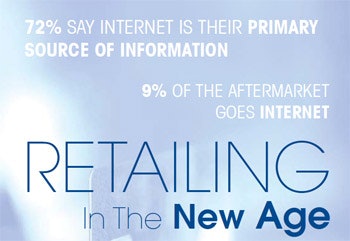
It's no secret that the staggering economy has caused customers to spend money more carefully. But there are other forces affecting the buying habits of pool and spa customers, including the rise of the Internet, lack of consumer confidence in retail staff as the trusted source of information, and consumer misperceptions of specialty retailers vs. other pool and spa supply sources.
Endeavoring to make sense of these market forces is a group of former executives who have banded together to form the Swimming Pool Retail Academy (SPRA), an entity which is trying to first understand the challenges of selling in this market, and then to help solve them through education.
A leader within the group is Larry Bloom, former president and CEO of BioLab. Bloom spoke with AQUA about the conclusions SPRA has reached so far based on industry research and one-on-one interviews with retailers as seen through the lens of the group's 75 years of combined experience. While SPRA is nominally a pool product retailer's group, its findings are applicable in many ways to spa retailers, and of course for the many independent stores that sell both pool and spa aftermarket products such as chemicals, spare parts and accessories.
A chemical engineer by training, Bloom has spent over 35 years in the pool industry. He was twice elected as chairman of the (then NSPI) Manufacturers' Council and Board of Directors. His current passion is using his industry expertise to develop education-based solutions to help industry retailers deal with the difficult countercurrents which many of them confront today.
While some of SPRA's observations and recommendations are not new, they bring clarity to the challenges specialty retailers face in today's economy.
In preparing this analysis, Bloom says, "we asked a large group of leading pool retailers and industry colleagues about their key business concerns. They helped us understand where we could make a difference in their businesses and where the industry was struggling to provide answers. With a strong trend of consumers turning to the Internet for product information and purchases, we realized that traditional, brick-and-mortar specialty retailers faced increased risk of losing loyal customers."
This anecdotal input was correlated with findings from consumer research provided by outfits like P.K. Data and Pew Research to assemble a list of six primary forces at work in specialty retailing. These are:
1) Changes in the economy"It's really important to understand," Bloom says, "with the decline in new construction, everybody's looking at the aftermarket — the retailer's main business driver — whether it's through digital approaches on the Internet or mass merchants. There's been a big increase in competition for the aftermarket."
And at the same time, consumers are being more careful in their spending. The combination of those two economic forces affecting retailers — increased competition and cautious spending by consumers — would form a strong drag on sales even if no other factors were in play.
2) Technology and the InternetTechnology is a force affecting all businesses, largely but not exclusively through the Internet, which has cut into retail aftermarket sales.
"It's really insightful for me to see that in only six years the Internet grew from one to nine percent of the aftermarket product share for inground pool owners ($288 million in Internet pool products sold in 2010).
"When you think of retailers losing nine percent of their business, how many of them can sustain that loss? And it's nine percent and growing."
3) Eroding consumer trust in retailer knowledgeAccording to consumer research from PK Data, 72 percent of pool owners now use the Internet as their primary source of information, while only 58 percent go to a dealer for information.
"That's a huge change," Bloom says. "For decades, dealers have told us that they're the knowledge experts, and their relationship with the pool owner is one of trust and confidence. So to drop to second place as a trusted source, with over 70 percent of owners using the Internet at their primary source, for me, was shocking."
4) Confusing consumer choice Seventy-one percent of customers in the market say they choose a specialty retailer because of their experienced and knowledgeable staff, but 72 percent say they choose the Internet first, according to surveys. This apparent disconnect would seem to indicate a growing gap between why consumers choose retailers and what retailers deliver.
5) Consumer perceptionAccording to PK Data, 45 percent of consumers say retailers are more expensive than other aftermarket sources. Consequently, retailers must provide value to offset that cost.
"What's insightful to me is that 16 percent of respondents thought the staff was uninformed or indifferent. And when we look at a number like 16 percent, that's a good chunk of business. If 16 percent of my customers thought the staff in my business was uninformed or indifferent, and they had come to me as a source of knowledge, then I'm at risk of losing that business. And I can tell you that there aren't that many retailers that could drop revenue by 16 percent and stay in business.
"For me, that's a bigger threat than the perception of being more expensive. If I'm a retailer, and 16 percent of the pool world thinks my staff is uninformed or indifferent, I'd want to take action."
6) Status quo thinkingThe final force in the equation is the same one Newton discovered over 300 years ago — inertia. A body in motion tends to continue that same motion, and a company with certain habits or systems tends to perpetuate them.
"We see a lot of status quo thinking out there," as Bloom puts it. "We find that there's a lot of reluctance to make the changes that must occur at the retail level. But the critical issue is this — retailers, and especially pool retailers, are losing their critical knowledge advantage."
And it's happening at the worst time, as retailers face stiff competition from mass merchants and Internet retailers looking to grab a share of the pool aftermarket business.
Demos And Demographics
Apart from economic and marketplace changes discussed above, the demographics of the pool industry are changing rapidly, too. Pool owners are getting younger. According to PK data demographics, half of pool owners are now under the age of 52.
"We tend to think of it as a maturing industry — you have to be older to afford a pool, etc. — but that's just not the case. The average age of a pool owner declined almost five percent in seven years," Bloom says.
"We know they're getting better educated, but the level of education is really amazing — 49 percent of pool owners with a college education versus 30 percent of the general population. They're just better educated than the general population and as we work with them we have to recognize that."
It follows naturally that there's an increased Internet usage and e-commerce among these younger pool owners.
Tying all this together is the idea of changing loyalty. With younger owners more comfortable with the Internet buying aftermarket pool supplies, it's more important than ever to impress these customers with a specialty retailer's knowledge and experience in water care.
"As we looked at all of these forces or factors, we tried to look at implications and make some inferences as to what a retailer needs to be focused on," Bloom says. "And we found that the changes that have taken place infer that an experienced, knowledgeable, customer-centric staff is really a leading virtue of retailers. It really needs to be front and center in all their planning.
"And retailers get that. As we talked one-on-one with retailers, they told us that educated employees build trust and credibility in the store. And they also told us that when an under-informed employee gives bad advice to a customer, that customer may never spend another dime in the store."
But as important as having a knowledgeable staff is, actually obtaining one can be problematic. Stores have turnover. Many have seasonal employees. And training is no easy proposition.
It's a real quandary for many, Bloom says. The typical approach is to have untrained employees shadow a store's experienced staff. But that can produce mixed results, and can hurt overall efficiency. And to bring a new employee to the point where he or she can speak competently about pools can take a very long time.
On top of that, Bloom adds, most retailers feel an aversion for the job itself. "The people we talked to told us, 'You know what? We really don't like training. We're not trained to be teachers. It's not our favorite thing to do. We don't wake up every day thinking, "I can't wait to get in there and train that new employee."'
Reaching The Knowledge Threshold
Retailers are smart people, Bloom says in summary. They know that they need knowledgeable employees ready to engage in a strong customer relationship approach with consumers. "They know it's important, but we find this contradiction that they tend to do other things than make sure that this critical success factor — the well-trained, knowledge-expert employee — is achieved.
"So they tend to put it off, it's sort of an afterthought, when it should be the primary thought. They do something — they all do something — and hope for the best."
One problem is that many retailers have a very narrow window for training seasonal employees. Often pool retailers hire college students and have to wait until they get out of school, by which time the mad rush of opening season is in full swing. Other times retailers don't want to hire too far in advance due to the extra cost.
Unfortunately, opening season is the time pool customers most need their retail store and its expertise. A great percentage of the products and customer guidance for the pool season are delivered in this period. In short, at this crucial juncture, it's essential for the retail staff to shine as product and water chemistry experts.
"But in the final analysis," Bloom says, "despite the importance of the early season in terms of total revenue for the year, and the readiness of seasonal employees as a factor in early-season success, what we do in general in this area leaves a lot to be desired. And it leads to a decline in being perceived as the knowledge expert in retailing which is hurting the industry."
"We think the retailers may be at an inflection point," says Bloom, "and in the course of our research it has become almost a passion of ours to share this insight so retailers who want to take some action have the chance to do so."
Comments or thoughts on this article? Please e-mail [email protected].












































